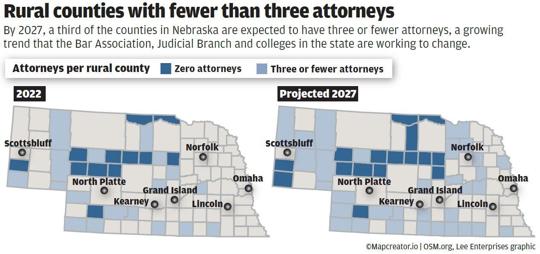Here’s a little known fact: A dozen counties in Nebraska currently have no practicing attorneys.
Zip from the towns of Bartlett, Hyannis or Stapleton. Zero from Arthur, Springview or Spencer. Zilch from Harrisburg or Hayes Center.
And by 2027, four more counties are projected to join them, according to the Nebraska State Bar Association.
In fact, by then half of the state’s counties are expected to have three or fewer attorneys unless something changes.
At the Judicial Resources Commission’s annual meeting in December, Nebraska Supreme Court Justice Stephanie Stacy went over the current numbers and the projections, illustrated by brightly colored maps.
A stripe of 16 counties crossed the center of the state, mostly north of the Platte River and hugging South Dakota’s border. Another 32 counties in pockets across the state were highlighted in a lighter shade.
A visual legal desert.
“This trend, if you will, will probably make courtroom technology and remote appearances a more critical need in our county courts,” Stacy said, speaking in a hearing room at the Capitol with members across the state watching by video.
Of the 5,547 attorneys with active law licenses living in Nebraska, the vast majority (83%) live in large urban areas, with 11% in small urban communities.
“And only 7% of Nebraska’s lawyers live in the rural communities,” she said.
Unlike the Lincoln and Omaha areas, where millennials (those born in the early ’80s to mid-’90s) now account for the largest category of practicing attorneys, in rural areas most are baby boomers getting closer to retirement.
Stacy said there are several programs actively working to retain and recruit lawyers to the state’s rural communities.
In 2013, the Nebraska State Bar Association started a rural practice initiative to connect law firms that were hiring with law students or new associates looking for jobs in Greater Nebraska.
“We hope to see a difference from that,” Stacy said.
And the state’s law colleges have partnered with Chadron State College, the University of Nebraska at Kearney and Wayne State College to create a Rural Law Opportunities Program to encourage the practice of law in the state’s rural areas.
You can read the full article at the Lincoln Journal Star.

